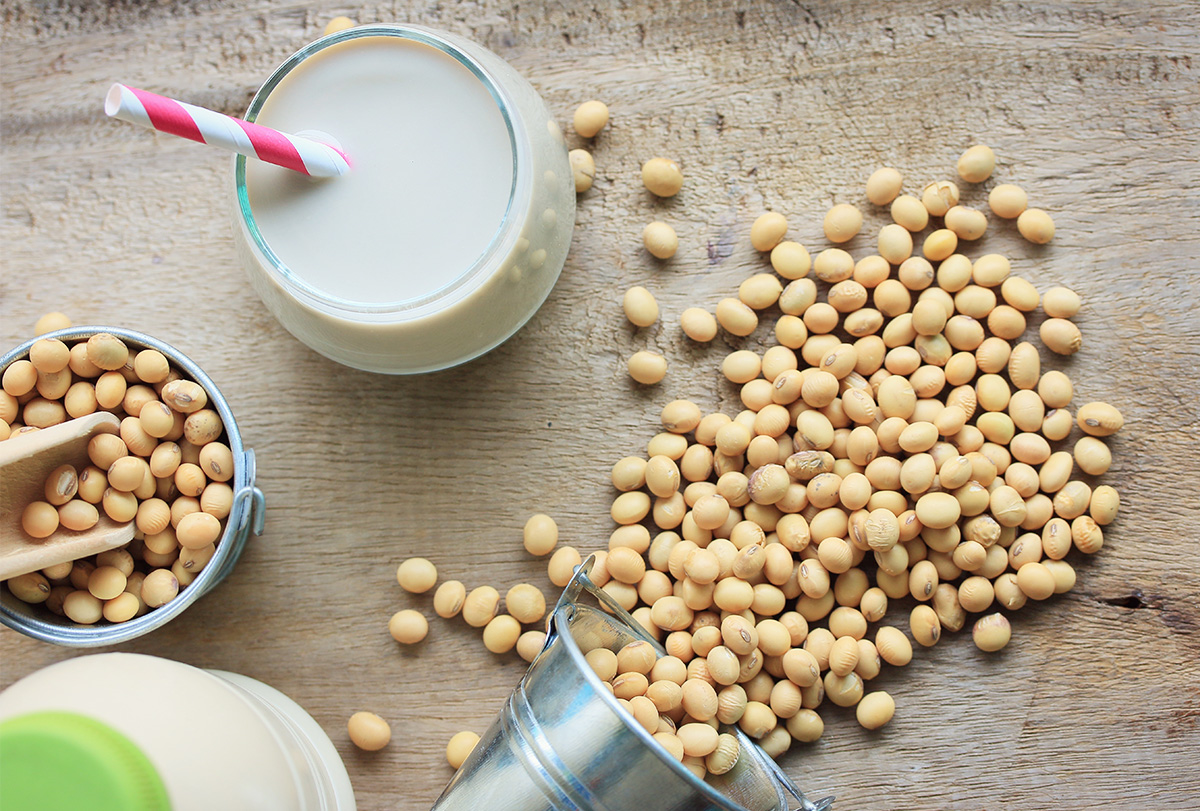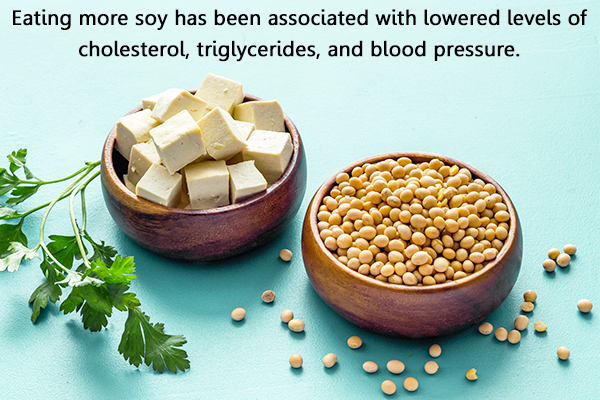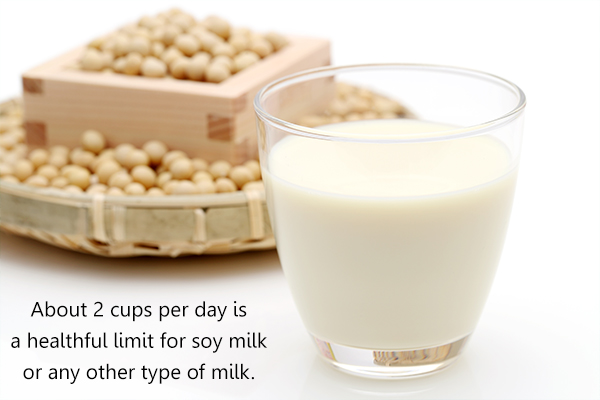In this article:
Soy contains all the essential amino acids, similar to meat, and is thus a popular protein source among vegans and vegetarians. Moreover, it can be processed to form milk and meat substitutes, widening its use in the daily diet.

Nutritional Profile of Soy
Soy offers several key nutrients:
- Most notably, soy is high in protein, making it a helpful staple food for vegans and vegetarians.
- Compared with other legumes, soy is much higher in fat and much lower in carbohydrates. (1)
- Unlike other beans, soybeans contain heart-health-promoting polyunsaturated fatty acids. (2)
- Whole soy foods are good sources of calcium, vitamin K, folate, and a few trace minerals.
- Soy is also rich in isoflavones, a naturally occurring plant compound with antioxidant, antimicrobial, and anti-inflammatory effects. Isoflavones may help prevent cancer and chronic disease. (3)
Common Soy Products
Soy products are foods and ingredients derived from the soybean (or soya bean) plant, which is native to East Asia. Under this umbrella, soy comes in many forms and variations:
- Soy-based foods include tempeh, tofu, edamame, soy milk, natto, and soy nuts.
- Soy is also the base of flavorful ingredients such as soy sauce or miso.
- Meat alternatives, snack bars, and baked goods might contain soy-based ingredients such as soy flour, soy protein, or soy lecithin.
- Soybean oil is made from soybeans’ fat components and is used as a cooking medium.
Health Benefits of Soy Products

Soy’s heart-health benefits have been researched for decades. Eating more soy has been associated with lowered levels of cholesterol, triglycerides, and blood pressure. (1) This could be explained by soy’s fiber, unsaturated fats, proteins, or a combination thereof.
The US Food and Drug Administration recommends consuming at least 25 g of soy protein per day to reduce the risk of coronary heart disease. (4)
Reduced cancer risk is another notable benefit of soy.
- People in geographic areas who consume the most soy, such as Asia, are less likely to develop certain types of cancer than Western women, this is often attributed to Asian women’s regular soy consumption. (5)
- Research has shown that even within Western regions, such as the United States and Canada, those who eat more soy protein are less likely to die of breast cancer. (6)
- The antioxidant and anti-inflammatory effects of soy isoflavones are most often credited with the anti-cancer mechanism. (1)
Difference Between Fermented and Unfermented Soy Products?
Some soy products are described as “fermented” because they are aged with bacteria (such as yogurt) to change their flavor and texture.
Some evidence suggests that fermented foods are easier to digest than their non-fermented counterparts and may have probiotic effects. (7) Tofu, tempeh, natto, and miso are all fermented soy products.
Soy sauce is traditionally fermented, but the inexpensive version you buy at the store or receive in a small takeout packet is likely chemically produced, which means it does not offer the health benefits of fermentation.
Recommended Daily Intake of Soy Milk

Unless you have a soy allergy, soy milk is an advisable daily milk choice.
Soy milk contains more fat and protein than other non-dairy milk (oat or almond) do, which makes soy more filling and nutritionally dense. About 2 cups per day is a healthful limit for soy milk or any other type of milk.
Anti-Nutrients in Soy Product
Anti-nutrients are organic or synthetic substances found in various foods that hinder the absorption of beneficial nutrients in the blood. The presence of such unfavorable elements, thus, dilutes the nutritional value of the said food.
The common anti-nutrients present in soy products include:
- Phytates
- Enzyme inhibitors
- Goitrogens
- Hemagglutinin
- Isoflavones
Soy Consumption and Estrogen Excess
Soy is often vilified as “estrogenic,” or can increase estrogen levels in the body, which has an element of truth but does not paint the full picture.
Soy isoflavones are indeed phytoestrogens, which are plant compounds that are similarly shaped to estrogen molecules and can, therefore, bind to estrogen receptors on cells. However, the estrogen-like effects of isoflavones are weak.
Some studies have found that phytoestrogens may help perimenopausal women experiencing symptoms such as hot flashes, but other studies claim these results are insignificant. (8) It is important to note that when soy isoflavones are examined in research studies, they are often in supplement form rather than whole-food form. (5)
In cases where the body already has high amounts of estrogen, phytoestrogens such as isoflavones may actually have an anti-estrogen effect.
In this scenario, phytoestrogens can block human estrogen from binding to cells, which may explain why eating soy isoflavones is associated with a lower risk of hormone-related cancers such as breast, cervical, prostate, and testicular cancers. (3)
Best Way to Maximize the Health Potential of Soy Products
As with any food, I recommend incorporating soy with as much variety as possible in your diet. Rather than eating tofu daily, try mixing in other soy proteins, such as tempeh, natto, and edamame.
If you are new to soy proteins, cooking them in a flavorful sauce or with a blackening spice rub can help make them tastier.
Allergic Reactions Related to Soy Intake

Soy is considered one of the top allergenic foods, along with milk, shellfish, wheat, peanuts, (9) tree nuts, and sesame, with about 1.5 million US adults reporting a soy allergy. (10)
Sometimes infants or children have soy protein allergies that subside as they age.
If you have an allergy to soy (or any other food), you will most likely notice a combination of these symptoms:
- Hives
- Itching
- Difficulty swallowing
- Throat swelling
- Chest tightening
- Trouble breathing
- Wheezing
- Vomiting
- Chest pain
- Rapid heart rate
- Fainting
- Low blood pressure
Final Word
The consumption of soy products is highly beneficial to health. They may not only lower the risk of some cancer types, inflammation, and fibroids but may also help improve heart health, bone strength, and menopausal symptoms.
- Was this article helpful?
- YES, THANKS!NOT REALLY


